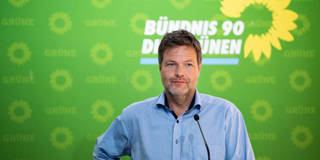With Germany's traditional parties continuing to hemorrhage voters, public support is swinging to the Greens, whose new leaders have been preparing the party for prime time. No longer just a movement of vegetarians and tree huggers, the Greens could soon find themselves governing the country – and grappling with a vexing dilemma.
BERLIN – If current polling trends continue, the next German chancellor could well be Robert Habeck, the co-leader of the Greens. His party has emerged as the strongest political force in the country in recent polls, and for weeks Habeck himself has ranked as one of Germany’s most popular politicians.
The Greens owe this seismic shift in their favor to several factors; chief among them is the German public’s growing frustration with the ruling “grand coalition” of the Christian Democratic Union (CDU); its Bavarian sister party, the Christian Social Union (CSU); and the Social Democrats (SPD).
Annegret Kramp-Karrenbauer, who succeeded German Chancellor Angela Merkel as the leader of the CDU in December, has been trying to restore her party’s popularity by emphasizing her conservative track record. But the CDU’s star continues to fall, and recent polls indicate that a mere 13% of voters consider Kramp-Karrenbauer a suitable candidate for chancellor.

BERLIN – If current polling trends continue, the next German chancellor could well be Robert Habeck, the co-leader of the Greens. His party has emerged as the strongest political force in the country in recent polls, and for weeks Habeck himself has ranked as one of Germany’s most popular politicians.
The Greens owe this seismic shift in their favor to several factors; chief among them is the German public’s growing frustration with the ruling “grand coalition” of the Christian Democratic Union (CDU); its Bavarian sister party, the Christian Social Union (CSU); and the Social Democrats (SPD).
Annegret Kramp-Karrenbauer, who succeeded German Chancellor Angela Merkel as the leader of the CDU in December, has been trying to restore her party’s popularity by emphasizing her conservative track record. But the CDU’s star continues to fall, and recent polls indicate that a mere 13% of voters consider Kramp-Karrenbauer a suitable candidate for chancellor.